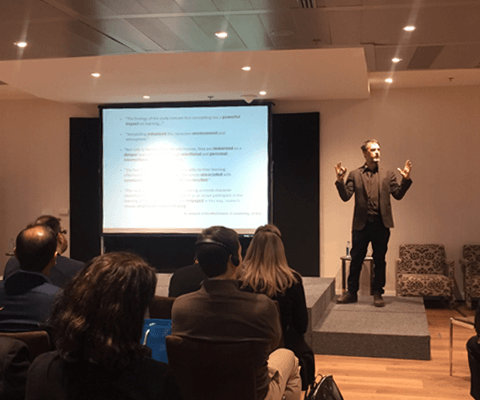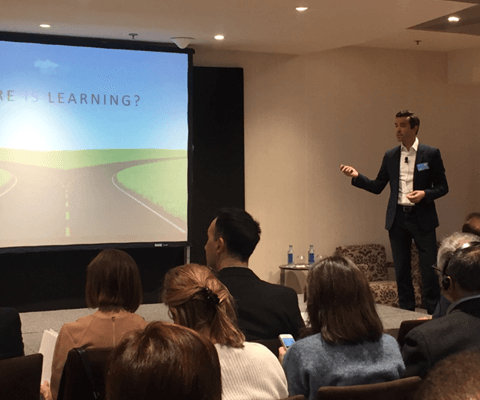Share
It’s a month today after the i-love learning 2017 event in Madrid. Following the “hangover” of this intense day focused on trends and future of e-learning, Ed Monk and Will Storr, two of the keynote speakers, offer a brief reflections on the themes of their respective conferences.
Will Storr: storytelling is learning

It was my great honour and pleasure to be invited by Netex to speak to the fifth annual I Love Learning event in Madrid, 2017. My presentation focused on the essentials of storytelling technique and looked at how these can be used to aid learning.
Story is the way the human brain understands the world.
Story is the way the human brain understands the world. Not only do we live our lives in narrative mode, as if we’re the hero of the constantly unfolding plot of our days, but the brain builds its understanding of how it all works by making observations of cause and effect.
Research shows that educators can use these principles to great effect.
Humans are naturally interested in other humans and their stories. By attaching the things we want to teach to human stories of struggle we can make any subject come alive. We turn dry facts into dramatic plot points, motivating people to want to learn, understand and remember. Moreover, simply remembering to structure our lessons so that they resemble the cause and effect pattern that the brain likes to much can help even young students more easily understand complex ideas.
Storytelling is how we understand the world. In many respects, storytelling is learning.
Ed Monk: corporate learning in 2017

I recently had the privilege of delivering a keynote presentation to 150 Heads of Learning in Madrid. The event was entitled I Love Learning, which is in its fifth year. Hosted by Netex, the day brought together an incredible mix of senior personnel with a collective commitment to learning.
The focus for my presentation was three things: Performance and Efficacy being key to any learning function, the six learning roles needed in a modern organisation, and what every Head of Learning must do in 2017.
Technology is where people are now learning; access to knowledge has replaced knowledge retention as power, so Learning must embrace technological change too, to maintain relevance and value.
We know that without being able to demonstrate impact organisationally and individually, learning professionals will find their roles are limited, so an ability to articulate clearly the real business impact from an organisational learning team is an imperative. Technology is where people are now learning; access to knowledge has replaced knowledge retention as power, so Learning must embrace technological change too, to maintain relevance and value.
New roles are appearing, such as Data Scientist, Content Curator, Community Manager, Video Producer. We need to adapt to include these skills in order that we can provide real change. Heads of Learning must keep up to date, network with peers, and engage with the business to align with the business. These are fundamental behavioural elements of any successful learning leader.
Congratulations to the Netex team for an inspiring event, and thank you to all those who attended.
Ed Monk
Ed Monk is MD of The Learning and Performance Institute. He has reviewed the changes his organisation have noticed within L&D departments and discussed what the future holds.
Will Storr
Will Storr is an award-winning author and journalist. Using the latest research from neuroscience and psychology, he revealed how by understanding the brain’s inherent storytelling process, we can use storytelling as a much more effective component within learning programme design.
Share

